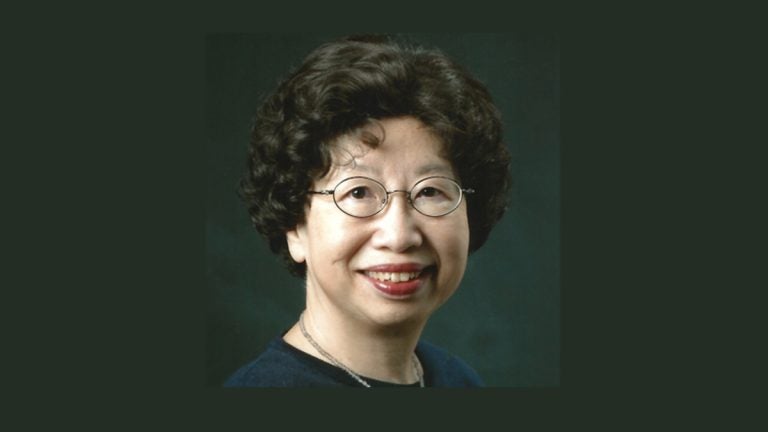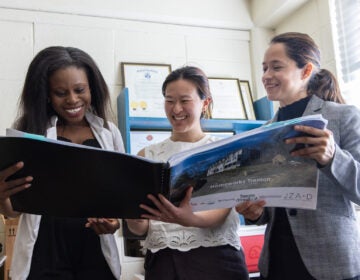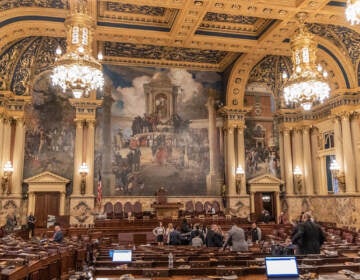Father knows best
As a young woman, Annabel Liu defied her father's demand that she study medicine. He could never see that her passion was writing — something she did until the day she died.

Annabel Liu (Provided)
Editor’s note: Annabel Liu passed away March 9. She completed this essay that afternoon.
—
I was 18, standing meekly and timidly in front of my father in our dining room.
My father was not an ordinary father. He ruled our family on matters large and small, and his power over us was absolute. On this particular occasion, he informed me that I was to major in medicine in college.
Ironically, my mother had studied medicine. In fact, she graduated at the top of her class from Dong-nan School of Medicine in Shanghai, but my father never allowed her to practice after marriage.
And, to be fair, I was the only one of his three children who consistently ranked first in class, and hence stood a real chance of getting into the medical school of the prestigious National Taiwan University, where the entrance competition was exceedingly fierce.
Unfortunately, I was also the only one who knew what I wanted to study — English literature.
Even through the buffer of time — more than six decades — I’m still astonished by my audacity in that very moment when I defied my omnipotent father in our first confrontation.
“No …” I stammered. “I want … to be … a writer.”
“A writer? Ha! What can you write? Who would care to read what you write? You’ll starve to death!“
His derisive questions quickly siphoned all the hope I had harbored since elementary school, but I refused to give up.
“I’m not interested in medicine!” I blurted out.
“How would a child know what her interests are?”
In desperation, I considered running away, but I knew it was hopeless — I had no place to go and would only be hauled back to face my father’s worse displeasure. I shuddered — I would rather die than to face that.
Impulsively, I headed for the river near our house, a lively spot in the summer but deserted on this chilly, overcast winter afternoon. I stood staring dully at the swiftly churning, muddy water. What a relief it would be to slip in and end all the emotions churning inside me.
Try as I might, I couldn’t manage the decisive jump. Dejected, I dragged myself home, my heart leaden as the sky above me.
A legal argument
For three days, I struggled to find a solution. Giving up English literature was unthinkable but now a must, and I abhorred the idea of studying medicine. Finally, I thought of law — it was practical, and my father had majored in it and practiced as an attorney in his younger days.
To my surprise, my compromise won his approval, and I successfully passed the entrance exam to the top university and enrolled in their four-year intensive law program.
The crisis was over.
Law courses were predictably dry and boring, but I managed to tune out the lectures and rank second on tests among 126 classmates. Every semester, my academic standing earned a small stipend — enough for me to treat a few friends to the movies.
Life was tolerable, but it hit a glitch in the spring of my sophomore year, when nursing schools from several states in America — Montana, Wyoming, and North Dakota — advertised full scholarships and jobs upon graduation. To qualify for this largesse, one needed only to be a high school graduate and to pass an examination.
It was an obvious ploy to lure those in Taiwan who had failed college entrance examinations. Nursing shortages in America in states with inhospitable climates and sparse populations must be acute indeed, I thought. I wasn’t worried, however, as it had nothing to do with me.
My father apparently thought otherwise. I was summoned to the dining room again and was told to take the nursing exam.
And relinquish the university spot other people would kill for?
“But I don’t want to be a nurse!” I protested.
“Why? Do you think you’re too good to be a nurse?”
“No, no, I’m just not interested in nursing.”
“How would a child know what her interests are?”
A few days later, I was in class when a man peered through the window. It was my father’s chauffeur: “You’re going to register for the exam.”
It was clear my father was determined to ship me to any American nursing school that offered a full scholarship. At 20 years old, I felt I was being buried alive, and there was nothing I could do about it.
I sank into a deep depression until days before the exam, when a meteor streaked across my mind. There was one loophole in my father’s scheme: He had all the power over me, but he was not me.
Failing a test, winning a life
The subjects of the two-day examination ranged from math to geography. For each test, I carefully filled in my name and registration number, stared at the paper for a long time, and turned in a blank sheet.
A few weeks later, my father barged into my room, livid, waving the newspaper in his hand. “Several of your high school friends passed and you didn’t?”
I could feel my heart pound — loud and heavy — and I broke out in a cold sweat.
“Maybe … I was … just …unlucky this time.”
My father stared hard at me, beyond furious. He didn’t believe me, but he could believe even less that I had the courage to defy him. Anyway, it was too late. I had failed the exam.
That was how I was allowed to finish my law studies. And I did make it to the U.S. after all, for graduate school. I received my graduate degree in journalism — another pragmatic subject assiduously selected to circumvent my father’s disapproval. Altogether, I wasted seven years of my precious, impressionable youth studying disciplines of no interest to me.
But what is interest? My father couldn’t see it or touch it, and didn’t believe mine could exist. For me, my lifelong interest in words is real, obstinate, and inextinguishable.
From the smoldering ashes I went on to write, in Chinese, seven collections of literary essays, short stories and a novel. I’ve written three memoirs in English, albeit with a nagging doubt in my mind, planted early by my father.
Still, I have never regretted my interest. It led me to rebel against a tyrant, flunk an exam and gain a life.
Annabel Liu came to this land on a freighter in 1957. A bilingual writer, she has published three memoirs in English, “My Years as Chang Tsen: Two Wars, One Childhood” (second edition); “Under the Towering Tree: A Daughter’s Memoir”; and “Where Chopsticks Meet Apple Pie: Cross-cultural Musings on Life, Family, and Food.” She has also published a novel and seven collections of essays and short stories in Chinese.
WHYY is your source for fact-based, in-depth journalism and information. As a nonprofit organization, we rely on financial support from readers like you. Please give today.




